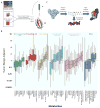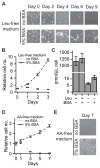Human pancreatic cancer tumors are nutrient poor and tumor cells actively scavenge extracellular protein
- PMID: 25644265
- PMCID: PMC4316379
- DOI: 10.1158/0008-5472.CAN-14-2211
Human pancreatic cancer tumors are nutrient poor and tumor cells actively scavenge extracellular protein
Abstract
Glucose and amino acids are key nutrients supporting cell growth. Amino acids are imported as monomers, but an alternative route induced by oncogenic KRAS involves uptake of extracellular proteins via macropinocytosis and subsequent lysosomal degradation of these proteins as a source of amino acids. In this study, we examined the metabolism of pancreatic ductal adenocarcinoma (PDAC), a poorly vascularized lethal KRAS-driven malignancy. Metabolomic comparisons of human PDAC and benign adjacent tissue revealed that tumor tissue was low in glucose, upper glycolytic intermediates, creatine phosphate, and the amino acids glutamine and serine, two major metabolic substrates. Surprisingly, PDAC accumulated essential amino acids. Such accumulation could arise from extracellular proteins being degraded through macropinocytosis in quantities necessary to meet glutamine requirements, which in turn produces excess of most other amino acids. Consistent with this hypothesis, active macropinocytosis is observed in primary human PDAC specimens. Moreover, in the presence of physiologic albumin, we found that cultured murine PDAC cells grow indefinitely in media lacking single essential amino acids and replicate once in the absence of free amino acids. Growth under these conditions was characterized by simultaneous glutamine depletion and essential amino acid accumulation. Overall, our findings argue that the scavenging of extracellular proteins is an important mode of nutrient uptake in PDAC.
©2014 American Association for Cancer Research.
Figures





References
Publication types
MeSH terms
Substances
Grants and funding
- UL1 TR001445/TR/NCATS NIH HHS/United States
- P30 CA016087/CA/NCI NIH HHS/United States
- P50GM071508/GM/NIGMS NIH HHS/United States
- P30 CA072720/CA/NCI NIH HHS/United States
- 1R01CA055360/CA/NCI NIH HHS/United States
- UL 1 TR000038/TR/NCATS NIH HHS/United States
- P50 GM071508/GM/NIGMS NIH HHS/United States
- R01 CA163591/CA/NCI NIH HHS/United States
- 1R01CA16359-01A1/CA/NCI NIH HHS/United States
- P30 CA016359/CA/NCI NIH HHS/United States
- R01 CA055360/CA/NCI NIH HHS/United States
- P30CA016087/CA/NCI NIH HHS/United States
- P30CA016087-32/CA/NCI NIH HHS/United States
- F31 CA186513/CA/NCI NIH HHS/United States
LinkOut - more resources
Full Text Sources
Other Literature Sources
Medical
Miscellaneous

